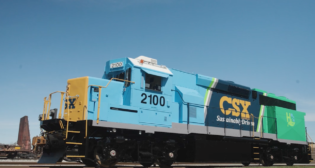
Report: Is KCS In Play?
Written by William C. Vantuono, Editor-in-Chief
Kansas City Southern President and CEO Pat Ottensmeyer.
Two private equity firms are considering a takeover bid for Kansas City Southern, according to a report based on information from anonymous sources in the Wall Street Journal posted late afternoon on July 31, just before the closing bell on Wall Street.
Blackstone Group Inc. and Global Infrastructure Partners are considering a joint bid “that could be worth more than $21 billion and mark a big bet on U.S.-Mexico trade,” the WSJ said. They are “together exploring a potential deal and speaking to banks including Citigroup Inc. about financing, according to people familiar with the matter. There is no guarantee they will proceed with a formal offer or that Kansas City Southern would be receptive. Assembling the roughly $15 billion equity check that could be required for a deal of that size would pose significant hurdles for Blackstone and GIP, which are investing out of $14 billion and $22 billion infrastructure funds, respectively.”
The WSJ said that, according its sources, “If there is a deal, it would be significant. Kansas City Southern had a market value of roughly $14 billion Friday afternoon [July 31] and including debt, the value of a bid could exceed $21 billion. The bid being discussed would likely include about $6.5 billion worth of debt financing.”
News of the potential deal prompted KCS stock (KSU) to rise 14.6%.

The “big bet on U.S.-Mexico trade” is consistent with what KCS President and CEO Pat Ottensmeyer, Railway Age’s 2020 Railroader of the Year, has been saying about the potential for cross-border freight traffic growth, now that the USMCA (U.S.-Mexico-Canada Agreement), the replacement for NAFTA, is in effect.
“The USMCA’s entry into force marks the beginning of a historic new chapter for North American trade by modernizing the 25-year-old North American Free Trade Agreement (NAFTA) in a manner designed to spur robust economic growth across the continent,” Ottensmeyer said in Railway Age’s July 2020 issue. “The agreement contains global best-in-class trade provisions in areas such as agricultural market access, digital trade, financial services, regulatory policy, and numerous other sectors. These enhancements will deliver more jobs, provide stronger labor protections, and expand market access, creating new opportunities for American workers, farmers and ranchers … The COVID-19 global health pandemic has caused multi-national companies to rethink their supply chain strategies. The strained relationship between the USMCA partners and China has introduced an emerging thesis in supply chain leaders, informally referred to as the ‘ABC (Anywhere But China) Strategy’ as they think about their future sourcing and procurement strategies … The combination of approval, and now entry into force, of USMCA on July 1, 2020, coupled with the emerging desire of global supply chain leaders to disfavor China, presents an enormous opportunity for investment in North America. North American railroads will play a critical role in facilitating this opportunity and leading our countries out of the current recession. Railroads connect the U.S., Mexico and Canada, and our networks are the backbone of North American supply chains.”
“The preliminary trade agreement with Mexico provides a positive longer-term outlook for KSU’s critical auto, intermodal and energy businesses,” Cowen and Company analysts Jason Seidl (Managing Director and Railway Age Wall Street Contributing Editor), Matt Elkott and Adam Kramer noted in their July 17 report on KCS’s 2Q2020 earnings. “The prospect of new oil drilling south of the border could prove to be a strong long-term growth driver to complement continued improvements in cross-border intermodal volume. We expect some operating leverage in 2H20 and service in Mexico to continue improving, with some benefit network-wide from PSR implementation. The USMCA trade agreement adds new areas of business for KSU, while KSU’s intermodal franchise takes market share … KSU continues to be our top rail pick, the result of the remaining cost reduction initiatives and numerous growth opportunities in Mexico and the Gulf Coast area.”
In another, related report, the Cowen analysts commented on KCS’s exclusivity provision in Mexico: “We view concerns around Kansas City Southern’s concession in Mexico as overblown. The exclusivity provision cannot be revisited until 2027, and the concession remains in effect for 20 years after that. Further, KSU is improving its operations via PSR, which should aid Mexico as reliable rail service is likely to be a necessity for the country as it grows its manufacturing base.”

As far as KCS’s receptivity to a takeover bid, Ottensmeyer had this to say in his Railroader of the Year interview with Railway Age Editor-in-Chief William C. Vantuono:
VANTUONO: My experience with Kansas City Southern goes back to the mid-1990s. There are two things that come to mind: Never complacent. Fiercely independent.
OTTENSMEYER: I would agree with that. Maybe some of it is our size. We’ve got to be on our toes because we’re surrounded by companies that are much larger than we are. Complacency would be very troublesome for our company. Fiercely independent? I would say the nature of our fierce independence has changed over time. A big part of our strategy for the past several years—this is really important—is the way we can connect, our philosophical approach, our desire and willingness to work with the other carriers to get to markets and offer our customers and their customers service options that we wouldn’t have, just based on our own network.
So that again is a very important part of our strategy, more so than most of the other large railroads. Because of our size, of where we’re located, the strategy of developing service options with our connecting carriers and our partners in the railroad industry is very important. I also think a really important part of our value proposition to our customers is that independence. If you’re an auto company building a new plant in central Mexico and you want service options to both railroads in the East, we’re happy to do it. If you want service options to both railroads in Canada, we’re happy to do it. I think we are more valuable to our customers because of our ability and our willingness to do that. If we were part of a bigger network, it might not be so easy.
THE COWEN INSIGHT

Cowen and Company Managing Director and Railway Age Wall Street Contributing Editor Jason Seidl, with analysts Matt Elkott and Adam Kramer, offer the following perspective:
“A detailed WSJ article cited reports that private equity firms are mulling a ~$21B bid for KCS, ~13xour 2021 EBITDA estimate or ~$190 per share—a ~20% premium to the unaffected share price. This would be a higher multiple than Brookfield’s takeover of Genesee & Wyoming last year. We view the chance of a strategic bidder as limited (but not out of the picture), given risks of governmental approval and shipper backlash.
“The WSJ article mentioned Blackstone and Global Infrastructure Partners among the firms, with the potential purchase price of more than $21B. The deal would likely require both equity and debt, given that Blackstone and GIP are investing out of $14B and $22B infrastructure funds, respectively.
“In recent years, there have been numerous M&A deals involving smaller short line railroads. The most recent transaction involving a publicly traded rail stock was the purchase in 2019 of short line consolidator Genesee & Wyoming by Brookfield Infrastructure and GIC (a sovereign wealth fund established by the Government of Singapore) for $8.4B, including debt. The per-share price of $112 for Genesee’s common stock was an early 40% premium and an ~11x multiple of the Street’s FY2020 EBITDA estimate. The July 2017 purchase of the Florida East Coast Railway by Grupo Mexico was also for a low-double-digit multiple.
“Given that KCS operates in both the U.S. and Mexico, there is greater regulatory risk than purchasing a railroad operating solely in the U.S. However, this PE bid should not receive the same level of scrutiny from the Surface Transportation Board from a competitive advantage standpoint that a bid from a competing railroad would likely get.
“In fact, we believe a strategic bid by a Class I railroad would have a few obstacles in the current environment. First, the STB implemented significantly higher hurdles many years ago when BNSF tried to merge with CN. The STB would also take some time to even consider it, since there are currently vacancies on the STB. Shippers would also likely rise up against a merger and attempt to block it. If there were to be competing bids from a strategic buyer, we would view BNSF, CP and CN as front runners, with Union Pacific also having interest. These Class I’s would be looking to add a complementary asset to their existing networks and gain access to the growing Mexican market. UP would, however, likely have to divest its near-25% stake in Ferromex, KCS’s main Mexican competitor.”



